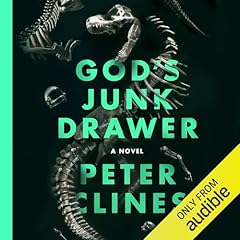
Afterparty
No se pudo agregar al carrito
Add to Cart failed.
Error al Agregar a Lista de Deseos.
Error al eliminar de la lista de deseos.
Error al añadir a tu biblioteca
Error al seguir el podcast
Error al dejar de seguir el podcast
 Exclusivo para miembros Prime: ¿Nuevo en Audible? Obtén 2 audiolibros gratis con tu prueba.
Exclusivo para miembros Prime: ¿Nuevo en Audible? Obtén 2 audiolibros gratis con tu prueba.Compra ahora por $21.09
-
Narrado por:
-
Tavia Gilbert
-
De:
-
Daryl Gregory
It begins in Toronto, in the years after the smart drug revolution. Any high school student with a chemjet and internet connection can download recipes and print drugs, or invent them. A seventeen-year-old street girl finds God through a new brain-altering drug called Numinous, used as a sacrament by a new Church that preys on the underclass. But she is arrested and put into detention, and without the drug, commits suicide.
Lyda Rose, another patient in that detention facility, has a dark secret: She was one of the original scientists who developed the drug. With the help of an ex-government agent and an imaginary, drug-induced doctor, Lyda sets out to find the other three survivors of the five who made the Numinous in a quest to set things right.
A mind-bending and violent chase across Canada and the US, Daryl Gregory's Afterparty is a marvelous mix of William Gibson’s Neuromancer, Philip K. Dick’s Ubik, and perhaps a bit of Peter Watts’s Starfish: A last chance to save civilization, or die trying.
©2014 Daryl Gregory (P)2014 Audible, Inc.Los oyentes también disfrutaron:




















Las personas que vieron esto también vieron:










What made the experience of listening to Afterparty the most enjoyable?
This was a very interesting story populated with very interesting people. I was impressed by the individuals who emerged from this author's mind. He's either possessed or a genius.What was one of the most memorable moments of Afterparty?
Conversations with Dr. Gloria were always memorable. We'd all be improved if there was a helpful and insightful inner voice-- but would we listen to it?Which scene was your favorite?
In this not-too-distant world, miniature cattle have been created through genetic engineering and one character keeps them in his living room. This is just a tiny part of the the story, but the reference to these mini-cattle is so casual, with none of the moral qualms that seem to plague our society. The description of this "Home on the Range" was a great scene.If you were to make a film of this book, what would the tag line be?
The opposite of the Twilight series.Any additional comments?
The narrator was spectacular. She delivered a myriad of distinctive voices and had brought the characters to life. It was a marvelous performance.Clever, Novel, Entertaining
Se ha producido un error. Vuelve a intentarlo dentro de unos minutos.
keeps readers amused
Se ha producido un error. Vuelve a intentarlo dentro de unos minutos.
The sci-fi elements are fairly benign for a near future tale. Scientifically and pharmacologically, the author is accurate and insightful in crafting an engaging and compelling tale, while at the same time maintaining scientific integrity. Beyond the biological neuroscience aspects, there's also exploration of what constitutes free will at the level of neurons.
The narration is superb, capturing the mood and tone of the tale. There's a solid range of both male and female voices with particular attention to individual peccadilloes.
Sophisticated and pharmacologically accurate
Se ha producido un error. Vuelve a intentarlo dentro de unos minutos.
Lyda Rose, the protagonist, was a neuroscientist who helped create Numinous. It was supposed to be a treatment for schizophrenia; instead, it helps its users find God. Or gods. Or some god.
The effect is spiritual if not supernatural: Numinous rewires the brain and provides you with your very own guardian angel (in Lyda's case, a judgmental winged psychologist named "Dr. Gloria"). The subjects are absolutely convinced they are receiving messages from the Divine, even if they know intellectually about Numinous. Lyda's conversations with her guardian angel, who she knows is a product of her drug-induced imagination, are believable because deep down, Lyda believes in her.
How Lyda came to be hooked on her own creation, and why she has to escape from a prison-hospital and track down the other former members of her little start-up company that was going to get rich, is a mystery that unfolds in a well-paced thriller with plenty of reveals and twists. There is an Afghan grandmother who is the most powerful drug lord in Seattle, a psychopathic hit man who calls himself "The Vincent" and raises bonsai buffalo herds in his apartment, a millionaire whose adopted daughter is a little prodigy assisted by her "deck" of "IFs" (Imaginary Friends), and of course, Dr. Gloria.
This wasn't quite a grand-slam of a book, but it was interesting and well-paced and original, with believable characters. Definitely recommended.
God is a drug in this near-future thriller
Se ha producido un error. Vuelve a intentarlo dentro de unos minutos.
This book was great but I didn't like it.
Se ha producido un error. Vuelve a intentarlo dentro de unos minutos.


